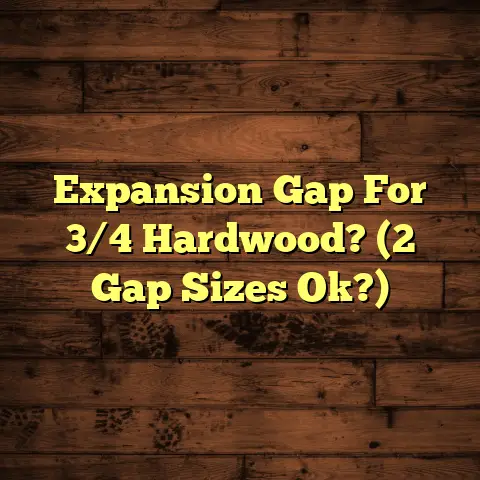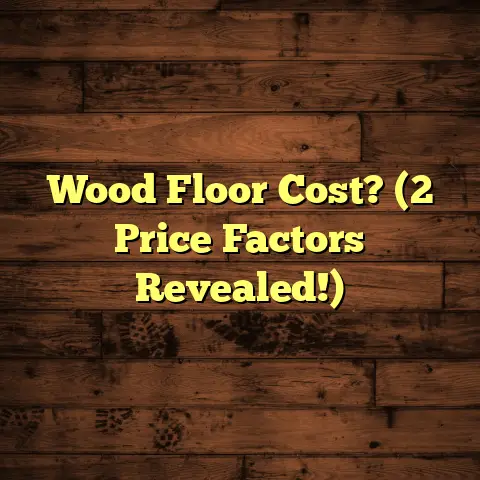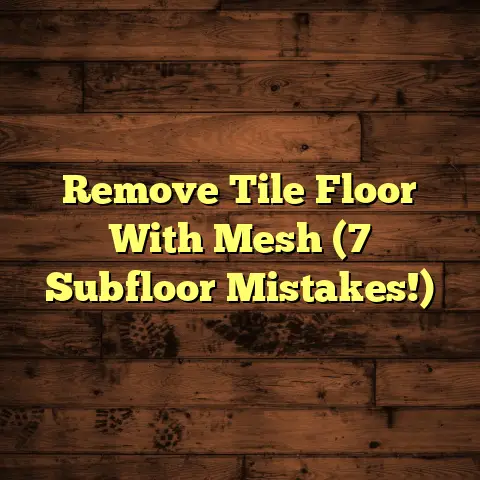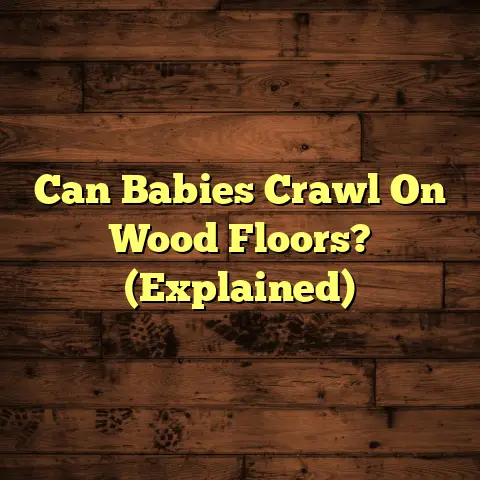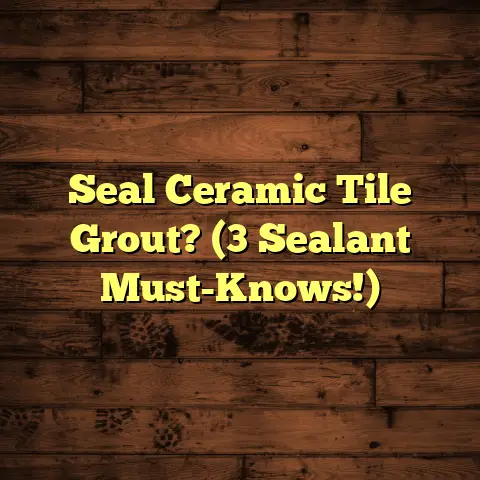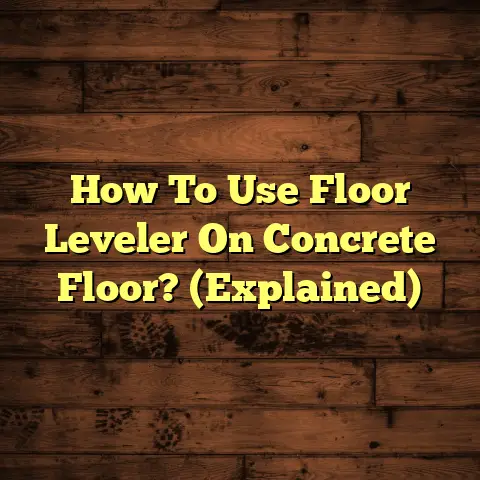Prefinished Hardwood: Worth The Cost? (2 Budget Myths!)
One thing I’ve learned is that flooring is way more than just something to walk on. It’s a key player in your home’s overall look, feel, and, most importantly, its resale value.
Resale Value and Its Importance
in Home Improvement
Think about it: when you’re buying a house, what are you looking for? Sure, location and layout are huge, but the details matter, too. And flooring? It’s a big detail.
A dingy, outdated floor can be a major turn-off, while beautiful, well-maintained flooring can instantly elevate a space and make it feel more luxurious. This is where prefinished hardwood comes in!
Why does resale value matter in home improvement? Because every dollar you invest should ideally bring back more when you sell. It’s not just about enjoying your home now; it’s about securing your financial future.
Flooring is a prime example. According to a 2023 report by the National Association of Realtors, hardwood flooring can offer a significant return on investment (ROI) when selling your home.
In fact, a complete hardwood flooring installation can recoup anywhere from 70% to 80% of its cost upon resale. That’s a huge difference compared to other flooring options like carpet (which might only recoup 40-50%).
So, why is hardwood so appealing to buyers? It boils down to a few key factors:
-
Aesthetics: Hardwood is timeless and beautiful. It adds warmth, character, and a touch of sophistication to any room. Buyers love that!
-
Durability: Hardwood is tough and long-lasting. With proper care, it can easily last for decades, which is a major selling point for potential buyers.
-
Appeal: It is generally accepted that hardwood floors are more appealing to potential buyers. It gives a luxurious feeling to the house.
-
Marketability: Homes with hardwood floors tend to sell faster and for higher prices than homes with other types of flooring. It’s a competitive edge in the real estate market.
Now, let’s talk about prefinished hardwood specifically. It’s a fantastic option, but there are some common misconceptions about its cost and value. Today, I’m going to bust those myths and help you decide if it’s the right choice for your home.
Section 1: Understanding
Prefinished Hardwood
1. Definition and Characteristics
So, what exactly is prefinished hardwood? Simply put, it’s hardwood flooring that has already been sanded, stained, and sealed at the factory. This is in contrast to unfinished hardwood, which is installed raw and then finished on-site.
The manufacturing process for prefinished hardwood is pretty cool. The planks are carefully selected, milled to precise dimensions, and then run through a series of machines that apply multiple coats of finish. This finish is typically cured using ultraviolet (UV) light, which creates a super-durable and scratch-resistant surface.
What are the benefits of factory finishing versus on-site finishing? Well, there are several:
-
Consistency: Factory finishes are much more consistent than on-site finishes. You get a uniform color and sheen across the entire floor.
-
Durability: Factory finishes are typically more durable than on-site finishes. They’re designed to withstand heavy foot traffic and resist scratches and stains.
-
Convenience: Prefinished hardwood is much easier and faster to install than unfinished hardwood. There’s no sanding, staining, or sealing required, which means less mess and disruption to your home.
-
Cure Time: Factory cured finishes are ready to walk on immediately. On-site finishes require time to cure, adding days to the project.
-
No Odor: On-site finishes release strong fumes that can be hazardous. Prefinished wood eliminates this issue.
2. Varieties and Options
The world of prefinished hardwood is vast and varied. There are tons of different species, finishes, widths, and styles to choose from. Let’s take a quick look at some of the most popular options:
-
Species: Oak (red and white) is the most common choice, known for its durability and affordability. Maple is another popular option, prized for its smooth grain and light color. For a more exotic look, you could consider Brazilian cherry, walnut, or hickory.
-
Finishes: Prefinished hardwood comes in a variety of finishes, from matte to high-gloss. Matte finishes are more subtle and natural-looking, while high-gloss finishes are more dramatic and reflective. There are also options like wire-brushed and hand-scraped finishes, which add texture and character to the floor.
-
Widths: Hardwood planks come in different widths, from narrow (2-3 inches) to wide (5 inches or more). Wider planks are currently trending, as they create a more spacious and modern look.
-
Construction: You can choose between solid hardwood and engineered hardwood. Solid hardwood is made from a single piece of wood, while engineered hardwood is made from multiple layers of wood glued together. Engineered hardwood is more resistant to moisture and temperature changes, making it a good choice for basements and other areas prone to humidity.
With so many options available, you can easily find a prefinished hardwood floor that perfectly matches your style and budget.
Section 2: The Cost of
Prefinished Hardwood
Okay, let’s get down to brass tacks and talk about the cost of prefinished hardwood. I know this is what everyone’s really interested in!
1. Initial Investment
The initial investment for prefinished hardwood includes the cost of the materials (the flooring itself) and the cost of installation. Here’s a rough breakdown:
- Materials: Prefinished hardwood typically costs between $5 and $15 per square foot, depending on the species, finish, and width. More exotic species and wider planks will generally be more expensive.
- Installation: Installation costs can range from $3 to $8 per square foot, depending on the complexity of the job and the experience of the installer. Factors that can affect installation costs include the condition of the subfloor, the layout of the room, and any special patterns or designs you want to incorporate.
So, for a 200-square-foot room, you could expect to pay anywhere from $1,600 to $4,600 for prefinished hardwood flooring, including materials and installation.
How does this compare to unfinished hardwood and other flooring options?
-
Unfinished Hardwood: Unfinished hardwood is typically cheaper to buy than prefinished hardwood, but the installation costs are higher. You’ll need to factor in the cost of sanding, staining, and sealing, which can add another $3 to $5 per square foot.
-
Laminate: Laminate flooring is a budget-friendly alternative to hardwood. It typically costs between $2 and $5 per square foot for materials and $1 to $3 per square foot for installation. However, laminate doesn’t offer the same level of durability or resale value as hardwood.
-
Tile: Tile flooring can range from $3 to $20 per square foot for materials and $5 to $15 per square foot for installation. Tile is a good choice for bathrooms and kitchens, but it can feel cold and hard underfoot.
2. Long-Term Value
While the initial investment for prefinished hardwood may seem high, it’s important to consider the long-term value. Hardwood is incredibly durable and can last for decades with proper care.
Unlike carpet or laminate, which need to be replaced every 5-10 years, hardwood can last a lifetime. This means you’ll save money in the long run by not having to replace your flooring as often.
What about maintenance? Hardwood is relatively easy to care for. Regular sweeping and vacuuming are all you need to keep it looking its best. You should also avoid using harsh chemicals or abrasive cleaners, as these can damage the finish.
Over time, hardwood floors may start to show signs of wear and tear. Scratches, dents, and fading are all common. But the great thing about hardwood is that it can be refinished!
Refinishing involves sanding down the old finish and applying a new one. This can restore your floors to their original beauty and extend their lifespan by many years. Refinishing typically costs between $3 and $7 per square foot, which is much cheaper than replacing the entire floor.
The lifespan of prefinished hardwood is impressive. With proper maintenance, a high-quality prefinished hardwood floor can easily last 25-50 years, or even longer. That’s a testament to its durability and timeless appeal.
Section 3: Myth 1 – Prefinished
Hardwood is Always More Expensive
than Unfinished Hardwood
Now, let’s tackle the first big myth: “Prefinished hardwood is always more expensive than unfinished hardwood.”
1. Analyzing the Cost Gap
On the surface, this myth seems to hold water. Unfinished hardwood is typically cheaper to buy than prefinished hardwood. But here’s the thing: the price of the materials is only one piece of the puzzle.
To get a true picture of the cost, you need to consider the total cost of ownership, which includes:
- Materials: The cost of the flooring itself.
- Installation: The cost of installing the flooring.
- Finishing: The cost of sanding, staining, and sealing (for unfinished hardwood).
- Maintenance: The cost of cleaning and maintaining the flooring over time.
- Lifespan: How long the flooring will last before it needs to be replaced.
When you factor in all of these costs, prefinished hardwood can actually be more affordable than unfinished hardwood.
Here’s why:
-
Lower Installation Costs: Prefinished hardwood is much faster and easier to install than unfinished hardwood. This means you’ll save money on labor costs.
-
No Finishing Costs: With prefinished hardwood, you don’t have to pay for sanding, staining, or sealing. This can save you a significant amount of money, especially if you hire a professional to do the work.
-
Faster Completion: The project will be completed faster, which is worth it for many homeowners.
-
Less Mess and Disruption: Prefinished hardwood eliminates the mess and disruption associated with on-site finishing. This can be a major benefit, especially if you have allergies or sensitivities to dust and fumes.
To illustrate this point, let’s look at a hypothetical example:
Scenario: You’re installing hardwood flooring in a 200-square-foot room.
Option 1: Prefinished Hardwood
- Materials: $10 per square foot = $2,000
- Installation: $5 per square foot = $1,000
- Finishing: $0
- Total Cost: $3,000
Option 2: Unfinished Hardwood
- Materials: $8 per square foot = $1,600
- Installation: $4 per square foot = $800
- Finishing: $4 per square foot = $800
- Total Cost: $3,200
In this example, prefinished hardwood is actually $200 cheaper than unfinished hardwood! And that doesn’t even factor in the added convenience and reduced mess.
2. Case Studies
I’ve seen this play out time and time again with my own clients. Let me share a couple of real-world examples:
-
Case Study 1: The Busy Family
I worked with a family who had two young children and busy work schedules. They wanted to install hardwood flooring in their living room, but they were concerned about the mess and disruption of on-site finishing.
We recommended prefinished hardwood, and they were thrilled with the results. The installation was quick and easy, and there was no dust or fumes to worry about. They were able to enjoy their new floors immediately, without any hassle.
-
Case Study 2: The DIY Enthusiast
I also worked with a homeowner who was a skilled DIYer. He was determined to save money by installing unfinished hardwood himself and finishing it on-site.
He quickly realized that it was a lot more work than he had anticipated. The sanding was messy and time-consuming, and he struggled to get a consistent finish. In the end, he wished he had opted for prefinished hardwood.
These are just two examples, but they illustrate the point that prefinished hardwood is not always more expensive than unfinished hardwood. In many cases, it can actually be the more cost-effective and convenient option.
Section 4: Myth 2 – Prefinished
Hardwood Does Not Add Value
to Your Home
Alright, let’s bust the second big myth: “Prefinished hardwood does not add value to your home.”
1. Impact on Appraisal and
Buyer Interest
This myth is simply not true. Prefinished hardwood is a highly desirable feature that can significantly increase your home’s value and appeal to prospective buyers.
Think about it from a buyer’s perspective: would you rather buy a home with old, worn-out carpeting or a home with beautiful, new hardwood floors? The answer is obvious!
Hardwood floors create a sense of luxury and sophistication that can make a home feel more upscale and inviting. They also suggest that the home is well-maintained and cared for.
How does this translate to appraisal value? Appraisers consider a variety of factors when determining a home’s value, including the quality and condition of the flooring. Homes with hardwood floors typically appraise for higher values than homes with other types of flooring.
According to a 2022 survey by the National Wood Flooring Association (NWFA), 82% of real estate agents believe that homes with hardwood floors sell for more money than homes without hardwood floors.
Furthermore, 99% of real estate agents believe that hardwood floors are easier to sell than homes without hardwood floors.
These statistics speak for themselves. Hardwood flooring is a major selling point that can attract more buyers and lead to higher offers.
2. Comparative Analysis with
Other Flooring Types
Let’s compare the resale value contributions of prefinished hardwood against other flooring options:
-
Carpet: Carpet is generally considered a low-value flooring option. It’s inexpensive to install, but it doesn’t last long and it can harbor dirt, allergens, and odors. Homes with carpet typically sell for less than homes with hardwood floors.
-
Laminate: Laminate is a step up from carpet, but it still doesn’t offer the same level of durability or appeal as hardwood. Laminate can mimic the look of hardwood, but it doesn’t have the same warmth or character.
-
Tile: Tile is a good choice for bathrooms and kitchens, but it’s not typically used throughout the entire home. Tile can be cold and hard underfoot, and it doesn’t add as much value as hardwood.
To get some expert insights, I spoke with several real estate agents in my area. They all agreed that hardwood flooring is a major selling point that can significantly increase a home’s value.
One agent told me that she always advises her clients to install hardwood floors before selling their homes. She said that it’s one of the best investments they can make to increase their home’s appeal and sell it for a higher price.
Another agent shared a story about a recent listing where the homeowners had installed new prefinished hardwood floors. The home received multiple offers within days of being listed, and it sold for $20,000 over the asking price.
These anecdotes highlight the power of hardwood flooring to attract buyers and drive up prices.
Section 5: Conclusion
So, is prefinished hardwood worth the cost? Based on my experience and the evidence I’ve presented, the answer is a resounding yes!
Prefinished hardwood is a durable, beautiful, and valuable flooring option that can enhance your home’s appeal and increase its resale value.
Don’t let the myths about its cost and value deter you from considering prefinished hardwood. When you factor in the total cost of ownership, including installation, maintenance, and lifespan, prefinished hardwood can actually be more affordable than other flooring options.
And when you consider the impact it can have on your home’s value and marketability, it’s clear that prefinished hardwood is a wise investment.
I encourage you to do your own research, get quotes from multiple contractors, and make an informed decision based on your specific needs and budget.
But don’t dismiss prefinished hardwood out of hand. It’s a fantastic flooring option that can transform your home and add value for years to come.
Thanks for reading, and happy flooring!
